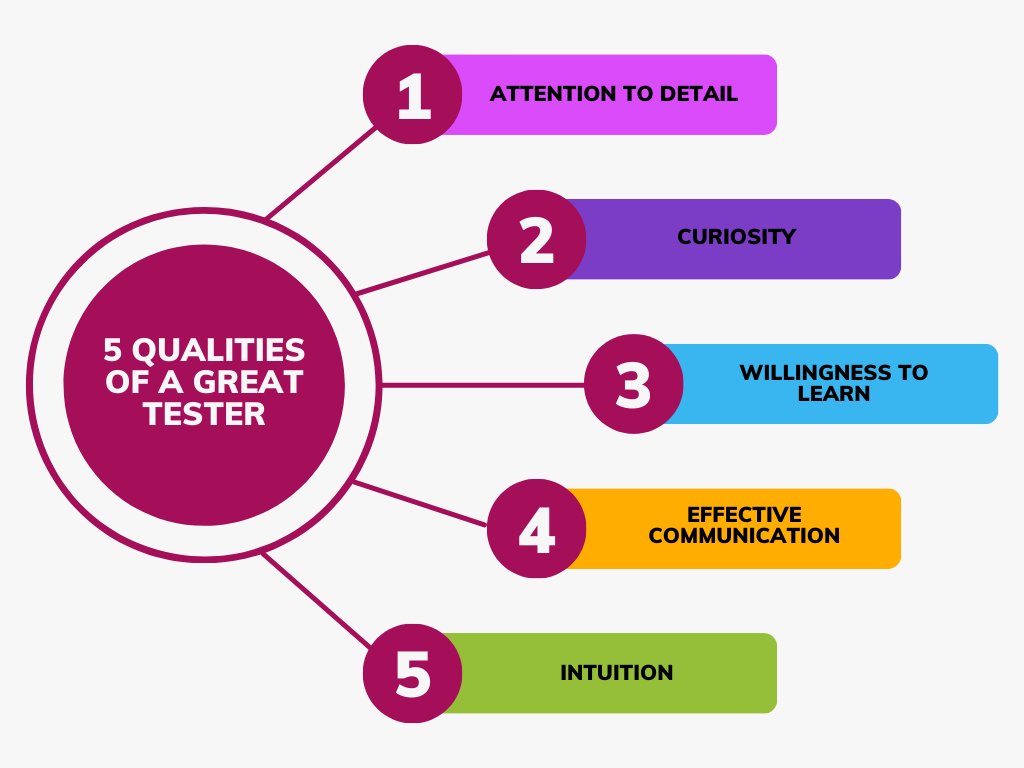
5 Qualities of a Great Tester
I was recently asked, “What makes a good tester in your opinion? Can you outline 5 qualities of a great tester?” Despite the abundance of excellent articles on this topic, I felt compelled to outline my own set of skills based on my experience in the testing industry over the years. The skills that define a good software tester may vary slightly depending on job roles and industries, but irrespective of specific details, I believe there is a core set of skills that every software tester should possess.
Without hesitation, I compiled the following qualities of a great tester:
- Attention to detail
- Curiosity
- Willingness to learn
- Effective communication
- Intuition
These skills, in my opinion, are fundamental for all software testers, regardless of their working environment or specific role.
Let’s go through each of them in detail.
Attention to Detail
This skill appears in almost every job description, and I believe for good reason. Firstly, this skill helps testers think about every possible scenario to test. Together with prioritisation, it can uncover issues in parts of the system that are not commonly used but can impact scenarios used by real users. Of course, testers can’t test all available scenarios, but attention to detail helps concentrate on the most important aspects of the product. Attention to detail does not allow ignoring problems. This skill is particularly useful, especially in the early stages of a project. Even if the issue seems small or occurs only once, it must be investigated. This means a good tester should never ignore even the smallest problems. Attention to detail helps build quality into the product. And that’s what it’s all about.
Curiosity
In the testing world, this skill has a lot in common with asking questions. Curiosity is helpful at every stage of a project, especially in the beginning when testers may ask questions during planning sessions, even before development has started. Testers can imagine various situations, anticipate different user behaviours, and challenge the team during meetings by asking questions about possible scenarios. Curiosity is particularly useful when actual development begins. It involves delving into parts of the system that are not obvious, trying scenarios that people might think never occur in the real world, and testing different circumstances for obvious scenarios. Curiosity keeps testers open-minded and encourages them to think outside the box.
Willingness to Learn
These days, everything is moving so quickly. There are so many things to learn, numerous conferences to attend, excellent books and magazines to read, and great training opportunities. There are also many professionals to connect with. The internet is full of valuable resources, and it would be a shame not to utilise them. I can’t imagine testers not keeping up with testing news, new techniques, and not trying to implement them in their work to improve processes. Sometimes, even when everything is going smoothly with a project, there is always room to introduce and experiment with something new.
Good Communicator
Being a good communicator is of the crucial qualities of a great tester, as they often have to convey challenging news to developers, product owners, and other stakeholders. Communication with developers is especially vital, and it must be conducted professionally and respectfully. When a tester identifies a bug, it should not be seen as a “victory” but rather as part of the process of building a quality product, which is the main goal of both testers and developers. In my experience, reporting bugs with all relevant details in a neutral manner helps foster strong relationships within the team. Throughout my testing career, I have worked with many different developers, and I have learned the importance of getting to know each team member and understanding how to communicate effectively with them. Opportunities to meet during company events or engage in casual conversations before meetings can facilitate better understanding and communication. Although working from home presents new challenges in this area, I have observed that it is not a significant problem. When professionals work together, treat each other with respect, and listen attentively, the outcomes are consistently positive.
Intuition
This is my favourite, to be honest. Believe it or not, I was always impressed when I had this feeling – ‘do more tests in this area’, ‘this looks a bit suspicious’, ‘am I sure this is expected behaviour?’, ‘check this one more scenario’. It took me a few years to actually start listening to my intuition and learn how to properly use it without ignoring it. It’s really hard to explain that feeling, but it exists, and I would not be wrong in saying it’s a kind of superpower for a tester. I am aware that someone who wants to be a good tester can read many books, articles, participate in conferences, and attend trainings, but without listening to intuition, it could be hard to perform at 100% and achieve the best results in day-to-day tasks.
There are plenty of other qualities that make a great tester, but these were the first ideas that came into my head, and I thought I would share my opinion about them. Some of these skills can be learned and honed, while others are innate abilities that determine whether software testing is the right fit for that person.
Read our blog post about ‘What good defect report should contain‘.



